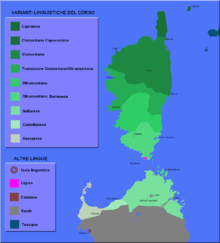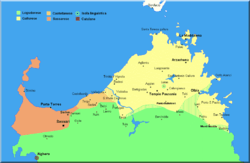Sassarese language
| Sassarese | |
|---|---|
| Sassaresu, Turritanu | |
| Pronunciation | [sasːaˈrezu] |
| Native to | Italy |
| Region | Sardinia |
Native speakers | 100,000 (1993)[1] |
| Latin (Italian alphabet) | |
| Official status | |
Recognised minority language in |
Sardinia (Italy) |
| Language codes | |
| ISO 639-3 |
sdc |
| Glottolog |
sass1235[2] |
| Linguasphere |
51-AAA-pe |
|
Languages of northern Sardinia | |
Sassarese (Sassaresu or Turritanu) is an Italo-Dalmatian language and transitional between Corsican and Sardinian. It is regarded as a Corsican–Sardinian language because of Sassari's historic ties (and neighborhood) with Tuscany and Corsica. Despite the heavy Sardinian influences (especially in the vocabulary and phonetics), it still keeps its Tuscan roots, which closely relate it to Gallurese. The latter is regarded as a Corsican dialect despite the geographic location, although this attribution is a matter of controversy. It can be considered a transitional language between Italo-Dalmatian languages [3][4][5] and Sardinian.[6] It has several similarities to Italian and in particular the old dialects of Italian from Tuscany.[3][4][5]
Sassarese is spoken by approximately 100,000 people, out of a total population of 175,000, in the northwest coastal areas of Sardinia, Italy. Large Sassarese-speaking communities are present in Sassari, Stintino, Sorso, and Porto Torres. Sassarese's transition varieties towards Gallurese, known as the Castellanesi dialects, can be heard in Castelsardo, Tergu, and Sedini.
Sassarese emerged as an urban language of commerce in the latter part of the age of the Giudicati (13th–14th century); it is based on a mixture of different languages, namely Corsican, Tuscan, and Ligurian; a strong Logudorese influence can be felt in its phonetics, syntax, and vocabulary; a minor influence in vocabulary was exercised by Catalan and Spanish. There exist many modern and older works both on and in Sassarese, and a number of cultural, social, and theatre events are held regularly in connection with it.
In 1943 the German linguist Max Leopold Wagner wrote:
... A dialect of the people which, by all indications, was formed gradually from the 16th century, after several very deadly plagues decimated the population of the city; the bulk of the survivors were of Pisan and Corsican origin, there were even Genovese. Thus was born this hybrid dialect which is now spoken in Sassari, Porto Torres and Sorso, whose base is Tuscan corrupted with traces of Genovese, in addition to not a few Sardinian words.— Max Leopold Wagner, "The problem of the geographical region to be attributed to Gallurese and Sassarese" in "Neolatin Culture 3" (1943), pp. 243–267
... un dialetto plebeo che, secondo tutti gli indizi, si stava formando a poco a poco a partire dal sec. XVI, dopo che varie pestilenze mortalissime avevano decimato la popolazione della città; dei superstiti la massima parte era di origine pisana e còrsa, e non mancavano neanche i genovesi. Così nacque quel dialetto ibrido che oggi si parla a Sassari, a Porto Torres ed a Sorso, la cui base è un toscano corrotto con qualche traccia genovese, e con non pochi vocaboli sardi.— Max Leopold Wagner, "La questione del posto da assegnare al gallurese e al sassarese" in "Cultura Neolatina 3", 1943, pp. 243–267
Official status
Sassarese is recognized as an official language by the regional government of Sardinia:[7]
The same value attributed to the Sardinian culture and language is recognised referring to the relative territory, to the culture and Catalan language of Alghero, the Tabarchino of the islands of Sulcis, the Sassarese and Gallurese dialect.— Autonomous Region of Sardinia., Art. 2, paragraph 4, Regional Law from 15 Oct 1997 about the "Promotion and valorization of the culture and language of Sardinia".[8]
Maps
 (in Italian) Sassarese compared to Sardinian dialects
(in Italian) Sassarese compared to Sardinian dialects (in Italian) Sassarese compared to Corsican dialects
(in Italian) Sassarese compared to Corsican dialects (in Italian) Other languages and dialects of Italy
(in Italian) Other languages and dialects of Italy Other Romance languages
Other Romance languages
References
- ↑ Sassarese at Ethnologue (18th ed., 2015)
- ↑ Hammarström, Harald; Forkel, Robert; Haspelmath, Martin; Bank, Sebastian, eds. (2016). "Sassarese Sardinian". Glottolog 2.7. Jena: Max Planck Institute for the Science of Human History.
- 1 2 Enrico, Costa (1992). Sassari (in Italian). Sassari: Edizioni Gallizzi. vol.I, pag.51.
Ai Pisani dobbiamo anche il nostro dialetto, che per la maggior parte è quasi lo stesso che vi si parla oggi - una specie di toscano del secolo XIII - corrotto più tardi da un po' di corso e da molto spagnuolo.
- 1 2 Mario Pompeo, Coradduzza (2004). Il sistema del dialetto (in Italian). Sassari. pp. refazione.
... il sassarese deriva dalla lingua italiana e, più precisamente, dal toscano antico, poi trasformatosi lentamente in dialetto popolare fin dal secolo XII, quando ancora i borghesi e i nobili parlavano in sardo logudorese. Durante l'età del Libero Comune (1294 - 1323), il dialetto sassarese non era altro che un pisano contaminato, al quale si aggiungevano espressioni sarde, corse e spagnole; non è quindi un dialetto autoctono, ma continentale e, meglio determinandolo, un sotto - dialetto toscano misto, con caratteri propri, diverso dal gallurese di importazione corsa.
- 1 2 Max Leopold, Wagner (1943). The problem of the geographical region to be attributed to Gallurese and Sassarese. Neolatin Culture 3 (in Italian). pp. 243, 267.
a dialect of the people which, following all evidences was formed step by step starting from the 16th century, after the period in which various deadly pestilences decimated the population of the city; most of the surviving people were of Pisan and Corsican origin, also quite a good number of Genovese people was part of the population. In this way the hybrid dialect that nowadays is being spoken in Sassari, Porto Torres and Sorso came into being. Its basis is a corrupt Tuscan with Genovese traces and quite some Sardinian terms.
- ↑ Mauro, Maxia (1999). Studi storici sui dialetti della Sardegna settentrionale (in Italian). Sassari: Studium Adf. pp. 21, 37.
Mentre il còrso della colonia sassarese subiva il forte influsso logudorese, specialmente nella sintassi e nel lessico" and "dopo il fortissimo influsso sardo subito dal còrso nel processo di sovrapposizione sull’originario logudorese
- ↑ Official Website of the Autonomous Region of Sardinia
- ↑ La medesima valenza attribuita alla cultura ed alla lingua sarda è riconosciuta con riferimento al territorio interessato, alla cultura ed alla lingua catalana di Alghero, al tabarchino delle isole del Sulcis, al dialetto sassarese e a quello gallurese. Regione Autonoma della Sardegna. Art. 2 comma 4, L.R. 15-10-1997 sulla Promozione e valorizzazione della cultura e della lingua della Sardegna.
External links
| Sassarese language test of Wikipedia at Wikimedia Incubator |
- A ischora di sassaresu - Sassari.tv
- Saggio di grammatica sassarese, Antoninu Rubattu
- TOGO, Dizionario Italiano-Sassarese
See also
- Sardinian, Corsican and Gallurese languages
- Sardinia, Sassari (Porto Torres, Sorso, Stintino, Castelsardo, Sedini and Tergu)

